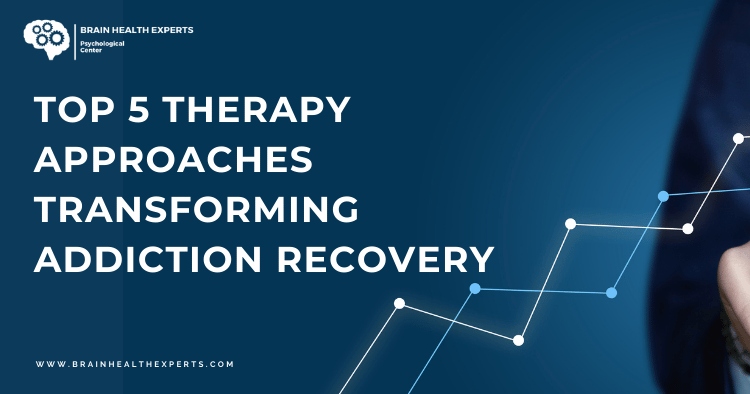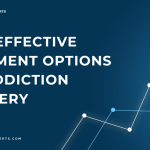Table of Contents
- Cognitive Behavioral Therapy (CBT)
- Motivational Interviewing (MI)
- Dialectical Behavior Therapy (DBT)
- 12-Step Facilitation Therapy
- Mindfulness-Based Relapse Prevention (MBRP)
Addiction recovery is a journey filled with challenges, yet with the right support, individuals can reclaim their lives. Therapy plays a pivotal role in this process, offering tools and strategies to navigate the complexities of addiction. Let’s explore five transformative therapy approaches that are making a significant impact on addiction recovery.
Cognitive Behavioral Therapy (CBT)
Cognitive Behavioral Therapy (CBT) is a widely used approach that focuses on the interplay between thoughts, feelings, and behaviors. In the context of addiction recovery, CBT helps individuals identify and modify negative thought patterns that contribute to substance use.
Key Features of CBT:
- Thought Restructuring: Clients learn to recognize irrational thoughts and replace them with healthier, more realistic ones.
- Behavioral Activation: Encouraging activities that promote positive emotions and reduce the likelihood of relapse.
- Skill Development: Teaching coping strategies to manage cravings and triggers effectively.
Research shows that CBT can significantly reduce relapse rates and improve treatment outcomes (National Institute on Drug Abuse). For those seeking immediate skills, CBT can be particularly empowering.
To further enhance your understanding of how positive thinking can support recovery, check out 10 Ways Positive Thinking Transforms Your Daily Life.
FAQs about CBT:
Q: How long does CBT typically last?
A: CBT can vary in length but usually consists of 12-20 sessions.
Q: Is CBT effective for all types of addiction?
A: CBT has been shown to be effective for various addictions, including alcohol, drugs, and gambling.
Motivational Interviewing (MI)
Motivational Interviewing (MI) is another influential therapy approach that focuses on enhancing an individual’s motivation to change. This client-centered method engages individuals in conversations that help them articulate their reasons for recovery.
Key Features of MI:
- Empathy and Support: MI practitioners use empathetic listening to create a safe environment for clients to explore their feelings about change.
- Ambivalence Resolution: Helping clients identify and resolve conflicting feelings about their addiction.
- Goal Setting: Collaboratively setting achievable goals that align with the client’s values.
Studies indicate that MI can effectively increase motivation for change, leading to better engagement in treatment (Miller & Rollnick, 2013). It’s an ideal approach for those who may feel resistant or unsure about recovery.
FAQs about MI:
Q: How does MI differ from traditional counseling?
A: MI is non-judgmental and encourages clients to find their own motivation rather than imposing solutions.
Q: Can MI be used alongside other therapies?
A: Yes, MI can complement various therapeutic approaches, including CBT and DBT.
Dialectical Behavior Therapy (DBT)
Dialectical Behavior Therapy (DBT) was originally developed for individuals with borderline personality disorder, but its principles have proven effective for addiction recovery as well. DBT emphasizes the balance between acceptance and change, making it ideal for those struggling with emotional dysregulation.
Key Features of DBT:
- Mindfulness: Fostering present-moment awareness to help clients observe their thoughts and feelings without judgment.
- Emotion Regulation: Teaching strategies to manage intense emotions that may lead to substance use.
- Interpersonal Effectiveness: Enhancing communication skills to improve relationships and reduce conflict.
Research shows that DBT can lead to significant improvements in emotional regulation and a decrease in substance use (Linehan et al., 2006). It’s particularly beneficial for individuals with co-occurring mental health disorders.
FAQs about DBT:
Q: Is DBT group-based or individual therapy?
A: DBT typically includes both individual therapy and skills training in a group setting.
Q: How long does DBT treatment usually last?
A: DBT often lasts for a year or more, depending on individual needs.
12-Step Facilitation Therapy
The 12-Step Facilitation Therapy model is grounded in the principles of Alcoholics Anonymous (AA) and other 12-step programs. This approach encourages individuals to embrace a community-oriented recovery process.
Key Features of 12-Step Facilitation:
- Peer Support: Encouraging participation in support groups to foster accountability and shared experiences.
- Spiritual Growth: Promoting the exploration of spirituality as a part of the recovery journey.
- Surrendering Control: Helping clients understand the importance of giving up control over their addiction.
Numerous studies indicate that individuals who engage with 12-step programs experience longer periods of sobriety and improved mental health (Project MATCH Research Group). For insights into how positive thinking can enhance relationships within these programs, refer to 10 Ways Positive Thinking Boosts Your Relationships.
FAQs about 12-Step Facilitation:
Q: Do I have to believe in a higher power to benefit from this approach?
A: No, while spirituality is a component, many find value in the community and support aspect, regardless of their beliefs.
Q: Can 12-step programs be effective on their own?
A: While they can be beneficial, combining them with professional therapy often yields the best results.
Mindfulness-Based Relapse Prevention (MBRP)
Mindfulness-Based Relapse Prevention (MBRP) is an innovative approach that integrates mindfulness practices with traditional relapse prevention strategies. This therapy helps individuals develop awareness of their thoughts and feelings, reducing the likelihood of relapse.
Key Features of MBRP:
- Mindfulness Meditation: Encouraging regular practice to enhance self-awareness and emotional regulation.
- Identifying Triggers: Helping clients recognize situations and emotions that may lead to cravings.
- Developing Coping Skills: Teaching techniques to respond to cravings with acceptance rather than avoidance.
Research supports the efficacy of MBRP in reducing relapse rates and improving overall well-being (Marlatt et al., 2011). Its focus on mindfulness equips individuals with the tools to navigate challenges with greater resilience.
For practical mindfulness techniques, consider exploring 10 Mindfulness Techniques to Reduce Stress Effectively.
FAQs about MBRP:
Q: Is MBRP suitable for all types of addiction?
A: Yes, MBRP can be beneficial for various forms of addiction, including substance use and behavioral addictions.
Q: How often do MBRP sessions occur?
A: MBRP is typically delivered in weekly sessions, often over 8 weeks.
Conclusion
The road to addiction recovery is unique for each individual, and therapy plays a crucial role in this transformative journey.
From Cognitive Behavioral Therapy to Mindfulness-Based Relapse Prevention, these five approaches provide valuable tools and support. If you or someone you know is struggling with addiction, consider reaching out to a qualified therapist who can help tailor a recovery plan that suits your needs.
For more information on addiction recovery resources, visit Substance Abuse and Mental Health Services Administration (SAMHSA) and National Institute on Drug Abuse (NIDA). Remember, recovery is possible, and you don’t have to do it alone!




